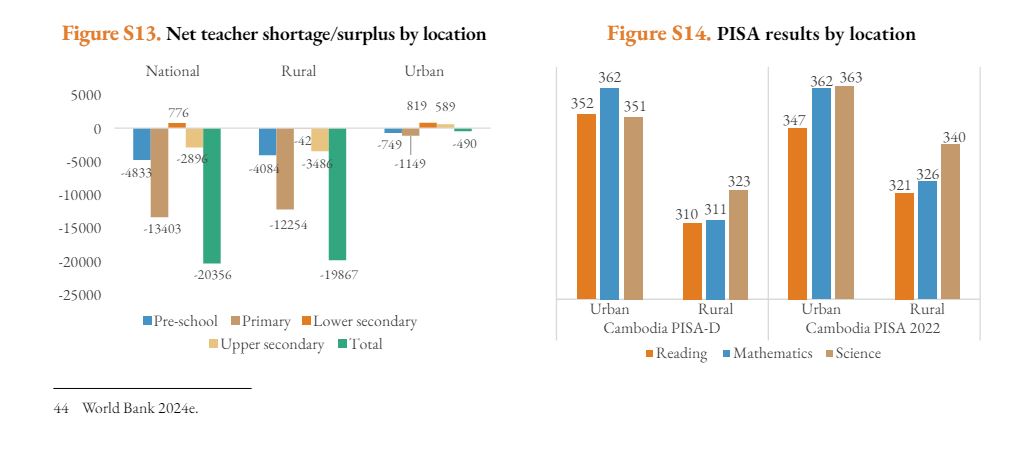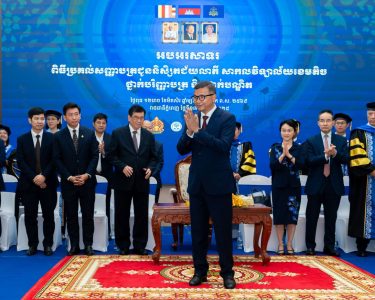Cambodia Investment Review
Cambodia has made significant strides in expanding access to education over the past decade, with the country’s net enrollment rates steadily increasing. Primary education attendance reached 90 percent in 2019, up from 81 percent in 2009, according to the Cambodia Socio-Economic Survey Reports. Enrollments at the lower and upper secondary levels have also shown progress. Despite these improvements, Cambodia faces numerous challenges in providing quality education to all its citizens, an issue exacerbated by the COVID-19 pandemic, which led to prolonged school closures and substantial learning losses.
Before the pandemic, Cambodia already grappled with high learning poverty rates, with students scoring low in both Khmer and mathematics. Disparities in access to education, especially at the secondary level, and variations in learning outcomes persist across different geographic locations and socioeconomic backgrounds. Investing in education is not only a social imperative but also an economic necessity. A well-educated, skilled workforce is essential for productivity, innovation, and competitiveness in today’s knowledge-driven global economy.
Economic & Societal Consequences Of Inaction Are Substantial
Countries that have prioritized educational investment, such as Finland, the Republic of Korea, and Singapore, have transformed into dynamic, high-income economies. Conversely, neglecting education can perpetuate intergenerational cycles of poverty, diminish workforce productivity, and impede a nation’s ability to adapt to technological advancements and global market shifts. In Cambodia, where learning poverty rates remain high and disparities in access and quality persist, the potential economic and societal consequences of inaction are substantial.
Cambodia’s Human Capital Index score of 0.49, as highlighted by the World Bank, underscores the urgency of addressing these challenges. This score indicates that a child born in Cambodia today will only be 49 percent as productive as they could be if they had access to complete education and full health. Improving educational outcomes, starting with foundational skills, is crucial for Cambodia to unlock its full human capital and drive sustainable economic growth. As Cambodia aspires to become an upper middle-income country by 2030, prioritizing human capital development through education will be essential.

In the past decade, there has been a notable increase in public expenditure on education, particularly on teacher salaries. However, this surge in resources has not necessarily led to better learning outcomes for students. Cambodia’s relatively low global standing in large-scale international assessments like the Southeast Asia Primary Learning Metrics (SEA-PLM) and the Program for International Student Assessment (PISA), along with declining learning outcomes, reflect this discrepancy.
The rise in government expenditure on education primarily stemmed from increased wages for educational staff, with wage expenditure constituting nearly 80 percent of total Ministry of Education, Youth, and Sports (MoEYS) expenditure in 2021. Conversely, capital expenditure by MoEYS has significantly declined.
Targeted Interventions To Alleviate The Economic Burden On Families
Of significant concern is the inefficient distribution of teachers, leading to large class sizes of 45 to 60 students. From 2013 to 2018, Cambodia had the highest student-teacher ratio for primary schools among its ASEAN counterparts. There is also a stark imbalance in the distribution of teachers between urban and rural regions as well as among provinces, with many rural areas consistently grappling with a severe shortage of teachers. At the provincial level, there is a concentration of teachers in Phnom Penh, while most other provinces face shortages.
Financial constraints are the primary barrier to secondary school enrollment in Cambodia. According to the World Bank, 59 percent of upper secondary school-age children and 38 percent of lower secondary level students cite economic pressures as the reason for not attending school. The disproportionate impact of financial hardship on secondary education highlights the need for targeted interventions to alleviate the economic burden on families.

To address these challenges and promote a more inclusive, effective, and resilient education system, several key policy recommendations have been put forward. These include prioritizing investment in early childhood education and primary schooling, enhancing teacher effectiveness through comprehensive management, ensuring equitable distribution of resources, and implementing evidence-based, cost-effective interventions.
Strengthening Institutional Capacity & Governance
Furthermore, addressing learning losses from the COVID-19 pandemic and strengthening institutional capacity and governance are essential steps. Collaboration and partnerships among stakeholders, including government agencies, development partners, civil society organizations, and communities, will be crucial in these efforts.
By focusing on these areas, Cambodia can build a more inclusive and resilient education system that prepares its citizens for the future. As the country continues to navigate challenges such as uneven resource allocation, limited teacher effectiveness, and gaps in foundational learning, it is more important than ever to ensure that the education system is resilient, equitable, and responsive to the needs of its learners.

In summary, investing in human capital through education is not only essential for individual well-being but also for Cambodia’s long-term economic growth and development. With a concerted effort to address the persistent challenges in the education system, Cambodia can unlock its full human capital potential and achieve its vision of becoming an upper middle-income country by 2030.





